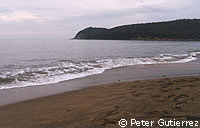UK researchers find oceans are polluted with plastic
A team of UK researchers has carried out the first ever survey of the presence of plastic fragments in oceans, and has found widespread evidence of this new form of marine pollution. A team led by the University of Plymouth took samples from 17 beaches and estuaries around the UK - from Land's End in the south to the north of Scotland - and examined particles which did not appear to be natural. Most samples were found to include fibres from materials such as nylon, polyester and acrylic. The team believes that that this research has only scratched the surface in terms of discovering the true extent of the presence of plastic in our seas, as the researchers only examined those particles which were an unusual colour and larger than 20 micrometres in diameter. The scientists also found evidence of these particles in creatures such as lugworms and barnacles, which feed on sediment. This implies that the fragments could make their way into the human food chain. The next stage in the research is to identify the possible environmental consequences of this contamination. 'I would say it is a cause for concern but not alarm,' Richard Thompson from the University of Plymouth told the journal Nature. The plastics themselves are not particularly noxious, but there is the possibility that they could cause long term damage in animals that eat them. Dr Thompson is also concerned that seaborne fragments of plastic could become coated with more dangerous industrial pollutants. And it does not matter where the water is in relation to very populated areas. Just as many plastic fragments were found in remote areas as in water close to large cities. The phenomenon is expected to get worse. The team tested plankton samples taken from survey ships travelling between Scotland and Iceland since the 1960s and found that the plastic content had increased significantly over the decades.
Countries
United Kingdom



